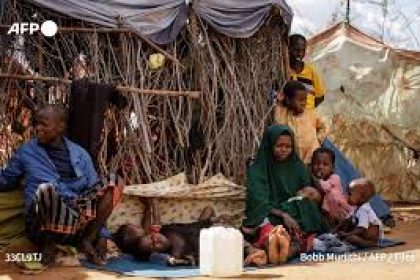
In a parched village in southern Africa’s tiny mountain kingdom of Lesotho, a farmer tramps through his dusty plot and pulls desiccated stalks and roots from the dry earth.
The plot once fed Daniel Phoofolo’s family, with enough produce left over to sell.
But a drought that has been biting countries across southern Africa for months has left it barren and bare.
Phoofolo’s wife has gone to neighbouring South Africa to find a job. He and his two small daughters have cut back to just two meals a day: bread and tea for breakfast, milk and maize-meal porridge for supper.
In a parched village in southern Africa’s tiny mountain kingdom of Lesotho, a farmer tramps through his dusty plot and pulls desiccated stalks and roots from the dry earth.
The plot once fed Daniel Phoofolo’s family, with enough produce left over to sell.
But a drought that has been biting countries across southern Africa for months has left it barren and bare.
Phoofolo’s wife has gone to neighbouring South Africa to find a job. He and his two small daughters have cut back to just two meals a day: bread and tea for breakfast, milk and maize-meal porridge for supper.
“I planted a row of potatoes but they are not growing because there is no rain,” Phoofolo told AFP.
Lesotho is a poor country. Nearly a quarter of its two million people are without work and half live below the poverty line, according to its development planning ministry.
Around 80 per cent rely on subsistence farming, the World Food Programme says.
For many farmers in Butha-Buthe, this year is the first that their crops failed, district councillor Tshepo Makara told AFP.
“Previously it has not been this bad… in Lesotho we survive on farming, and the harvest has not been good,” he said.
“That has resulted in high numbers of affected people and that is why the government had to intervene.”
‘No rain’- A temporary employment scheme pays local Basotho people 500 loti ($27, 25 euros) for two weeks of work such as road maintenance and cleaning cemeteries, Makara said.
Among those taking part is 59-year-old Arabang Polanka, a slim widower with four children who works on a road project.
Only a few small cabbages survive in his dusty patch, where previously beetroot, spinach and onions grew.
Polanka’s children now go to school without breakfast. He is worried that soon they may have to go to bed without supper.
“It is dry and there is no rain,” the frustrated farmer said.
Near his home in Lipelaneng village, a group of women do the laundry in a small pool at the end of a dried-up river as a child leads a donkey in search of water.
Faced with the scenario of thousands going hungry, Prime Minister Sam Matekane has appealed for aid and allocated two million loti to assist vulnerable families.
The WFP expects the situation to worsen as the drought persists.
At least 27 million people have been affected across southern Africa, where many depend on agriculture, acting regional director Lola Castro told AFP in an interview.
Worried about future – The failure of their crops also wipes out a source of cash for Lesotho’s subsistence farmers. There has been an increase in stock theft as people can barely afford meat, Makara said.
While authorities urge farmers to turn to drought-resistance crops such as sorghum, some in this part of Lesotho are pooling their scant resources and their labour in village gardens, from which they can share the yield.
Phoofolo, also looking for solutions, is planning to dig a small dam in case the rains fail again.
The drought “troubles me a lot,” he said. “I end up not able to sleep at night.”

